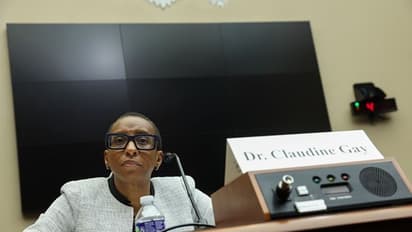Jewish students sue Harvard University alleging 'deep-seated' antisemitism

Synopsis
Harvard University is currently embroiled in a legal battle as Jewish students file a lawsuit, alleging that the prestigious institution has failed to address the surge in antisemitism on campus.
Jewish students at Harvard University have filed a lawsuit alleging that the institution failed to address and punish antisemitism on campus, particularly following the Hamas attack on Israel. The legal action, filed in Boston federal court, claims that Harvard administrators did not enforce policies designed to protect Jewish students from antisemitic speech and conduct. This development comes amidst significant upheaval at Harvard, where President Claudine Gay recently resigned. The lawsuit references a US civil rights law previously used against other universities.
The turmoil at Harvard involves criticisms of President Gay for not promptly condemning the Hamas attack, mishandling her congressional testimony on December 5 regarding antisemitism, and facing allegations of plagiarism. The legal action sheds light on heightened tensions on campus and raises questions about Harvard's handling of antisemitism issues.
"It is clear that Harvard will not correct its deep-seated antisemitism problem voluntarily," Marc E. Kasowitz, whose firm filed the lawsuit, said in a statement. "Jewish students at Harvard are being subjected to vile and threatening antisemitic harassment and calls for the murder of Jews."
In response to the issue of antisemitism, the university has taken proactive measures, implementing additional training programs for students, faculty, and staff. Furthermore, an anonymous hotline has been promoted to encourage the reporting of bias incidents. The Office for Equity, Diversity, and Inclusion at the school has collaborated with a campus Jewish group to organize community support sessions, along with providing counseling and mental health services.
Alexander Kestenbaum, a student at Harvard Divinity School, initiated legal action under Title VI of the Civil Rights Act of 1964. This law prohibits discrimination based on race, color, or national origin. Kestenbaum's lawsuit also alleges a breach of contract, citing various Harvard policies, including those related to student conduct.
"Harvard, America's leading university, has become a bastion of rampant anti-Jewish hatred and harassment," according to the complaint. "What is most striking about all of this is Harvard's abject failure and refusal to lift a finger to stop and deter this outrageous antisemitic conduct and penalize the students and faculty who perpetrate it."
Alongside Kestenbaum, the lawsuit was brought forward by Students Against Antisemitism Inc., a non-profit organization comprising unidentified Harvard law students and a graduate student in public health. Notably, Kestenbaum is also a member of this organization.
The formal complaint calls upon a judge to instruct Harvard to take action against faculty and administrators involved in antisemitic discrimination, urging disciplinary measures for students engaged in such behavior. Additionally, the lawsuit seeks to compel Harvard to reject or refund donations linked to the hiring or promotion of professors who endorse antisemitism. Financial damages are also being pursued in the complaint.
Harvard University faced intense scrutiny when over 30 student groups signed a petition placing sole blame on Israel for the October 7 attack. President Gay came under heavy criticism from both alumni and students for her delayed response and for permitting protests that were perceived as harassing and intimidating by Jewish students. These protests also disrupted classes.
The ensuing tumult has resulted in a tarnished reputation for Harvard, triggering a revolt among its affluent donors and exacerbating divisions between faculty, students, and administrators. The Harvard Corporation, the institution's top governing body, is now in the process of searching for a successor to President Gay.
Amidst this backdrop, the university finds itself at the epicenter of broader national discussions on academic freedom, free speech, diversity, and governance—issues that have long been sources of division within the campus community.
Harvard is currently under several federal investigations, including a Title VI probe by the Education Department examining allegations of discrimination related to antisemitism or Islamophobia.
In addition, Congress initiated two separate investigations following a December 5 hearing on Capitol Hill focused on antisemitism. During this hearing, the presidents of Harvard, Penn, and MIT provided testimony that was widely criticized. They failed to explicitly state that advocating for the genocide of Jews violated university policies, leading to the resignations of both President Gay and Liz Magill, Penn's president.
On Tuesday, the House Committee on Education and the Workforce formally requested extensive information from Harvard Corp. Chair Penny Pritzker and interim President Alan Garber. This request includes all documents and communications pertaining to antisemitism on campus since early 2021.
Claudine Gay, Harvard's first Black leader, resigned on January 2, after a brief six-month tenure.
Check the Breaking News Today and Latest News from across India and around the world. Stay updated with the latest World News and global developments from politics to economy and current affairs. Get in-depth coverage of China News, Europe News, Pakistan News, and South Asia News, along with top headlines from the UK and US. Follow expert analysis, international trends, and breaking updates from around the globe. Download the Asianet News Official App from the Android Play Store and iPhone App Store for accurate and timely news updates anytime, anywhere.